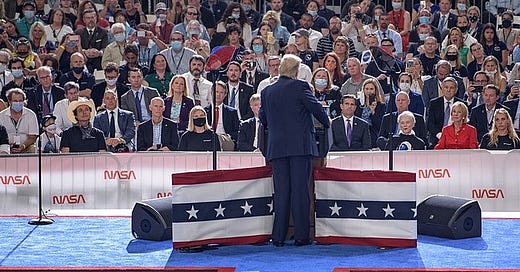A warm welcome to all new subscribers. I love writing this newsletter but it does take a lot of work. If you enjoy it and can afford it, please do consider taking out a paid subscription. And please do share this free post with anyone you think might be interested and encourage them to subscribe too. As always, I value your comments and feedback!
On July 28, 2000, Russian President Vladimir Putin held a meeting at the Kremlin with 21 of the country's wealthiest men. Putin, then just a few months into his first term, told them they could keep their riches gained during the 1990s fire-sale privatization of state assets if they agreed to stay out of politics.
Those who adhered to this deal got to keep their wealth; to this day, some of them, like Vladimir Potanin and Oleg Deripaska, remain among Russia's richest men. However, oil CEO Mikhail Khordokovsky funded opposition candidates in the 2003 parliamentary elections and was imprisoned for 10 years in Siberia, and media mogul Vladimir Gusinsky had his independent television channel, NTV, taken over by the state. (Gusinsky, who had fled to Spain after being put under investigation for his role in the 1990s privatization, was not invited to the July meeting.)
I thought of Putin's effort to get the oligarchs to work for him as some billionaires and CEOs have toned down criticism of Trump in the closing days of the U.S. election. Most notably, Jeff Bezos, the executive chairman of Amazon and owner of the Washington Post, spiked the editorial board's endorsement of Kamala Harris. Bezos' companies have billions of dollars in federal contracts at stake, and, according to the Post, Trump sought to retaliate against his companies for the newspaper's journalism while in office. (Bezos has insisted that the decision was made to avoid a "perception of bias.") If he is elected to a second term, Trump has vowed retribution; in his first term, he used the federal government to punish his perceived enemies in business.
Trump admires Putin and what he sees as the Russian people's deference to their leader. In an interview last month with Bloomberg Editor-in-Chief John Micklethwait, Trump said: "Russia never had a president that they respect so much…I went into Russia, and people said, oh, he likes Putin, and Putin likes him."
Already taking a page out of Putin's playbook, Trump has promised to give preferential treatment to businesses that do his bidding. The Post reported that in a private meeting last April he asked oil CEOs to donate $1 billion to his campaign and vowed to reverse environmental regulations; he told them the donation would be a "deal" because of the taxation and regulation the companies would avoid. Similarly, Trump once called cryptocurrency a "scam." But after a group of bitcoin miners met with Trump and promised to raise $100 million and turn out 5 million voters for him, hours later, Trump posted on social media about "Biden’s hatred of Bitcoin" and said "We want all the remaining Bitcoin to be MADE IN THE USA!!!" (Bitcoin and some cryptocurrencies use copious amounts of energy, making them targets for government regulation.) Trump made a similar reversal on vaping policy after meeting with a top vaping lobbyist.
Perhaps the biggest example of Trump's extraordinary promises to big business is his dealings with Elon Musk, who talks regularly with Putin, according to the Wall Street Journal. The CEO of SpaceX and owner of X has donated at least $118 million to pro-Trump groups. Trump has promised to appoint Musk, the world's richest man, as the head of a new “government efficiency commission," essentially giving him power to control the federal regulators who regulate his businesses.
While Musk jumped on the stage at a Trump rally, other billionaires have been tiptoeing around their support for Kamala Harris. The New York Times reported that Bill Gates privately said he donated $50 million to a pro-Harris group. Michael Bloomberg also quietly made a $50 million donation to a pro-Harris group. (Bloomberg did not issue a press release about the gift, as he usually does after making large donations.) According to the Times, JP Morgan CEO Jamie Dimon privately supports Harris, but "isn’t making his stance known publicly because he’s fearful that if Mr. Trump is victorious, he could retaliate against the people and companies who publicly opposed his run." It is surprising, then, that Forbes estimated that Harris has more billionaires supporting her, by a 83-52 margin. (Mark Cuban is somewhat of an outlier in his vocal support for Harris.)
There is a critical difference between Russia and the U.S.: Russian oligarchs were essentially given state assets and got wealthy off of them, whereas American wealth hasn't been as closely linked to the state. Russia's oligarchs participated in the corrupt loans-for-shares scheme of the 1990s and financially backed President Boris Yeltsin's reelection in 1996 against a Communist Party challenger, so the notion of them being under Kremlin direction in 2000 wasn't so unusual. Meanwhile, the only precedent for the retribution that Trump is vowing is his first term; the position he has promised to Musk would create conflicts of interest without any precedent. But Trump has Putin to model how to bring wealthy businessmen to heel -- and even before he may become president, many are acting accordingly.




